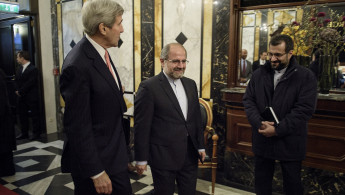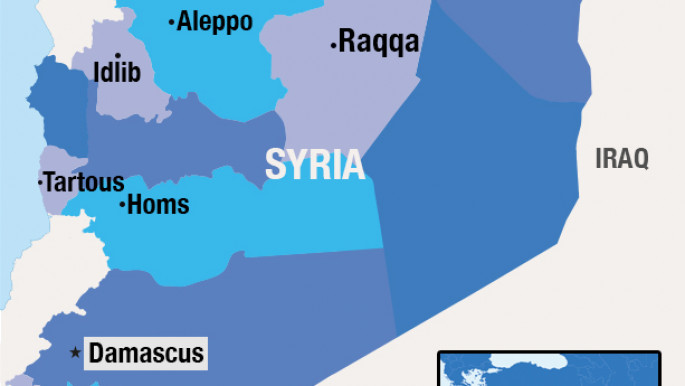Syria crisis talks to resume in two weeks
Major powers will meet again in two weeks' time for another round of talks on a political solution to the Syrian war, French Foreign Minister Laurent Fabius said Friday.
"We discussed all issues, even the most difficult," he told reporters after an initial round of talks, which for the first time brought together all the main foreign actors in the conflict.
"There are points of disagreement, but we advanced enough for us to meet again, in the same configuration, in two weeks," he added.
Top diplomats from more than a dozen nations had gathered in Vienna to narrow differences over the fate of President Bashar al-Assad, who has defied Western demands to step down.
In a sign of its growing diplomatic clout, Iran, a longtime sponsor of Assad's regime, joined the talks for the first time, months after striking a landmark nuclear deal with world powers.
|
|||||
But there was no talk of representatives of the Syrian regime or the opposition attending the talks aimed at ending a four-year war that has claimed a quarter of a million lives.
In Washington, which along with its Arab and Turkish allies backs Syrian rebels, officials had expressed a cautious hope that the players would agree the outline of a transition that would eventually see Assad step aside.
US Secretary of State John Kerry, while warning against an immediate solution, has described the talks as "the most promising opportunity for a political opening we have seen".
He met separately with Iran's Foreign Minister Mohammad Javad Zarif and Russia's Sergei Lavrov on the eve of Friday's meeting.
"Now it is the right time to bring Iran to the table," Kerry said.
Later, Kerry and Lavrov were joined by foreign ministers Feridun Sinirlioglu of Turkey and Adel al-Jubeir of Saudi Arabia.
Russia, which has waged a month of intense airstrikes against Assad's armed opponents, has also urged preparations for parliamentary and presidential elections in Syria.
But the idea has been rejected by rebels who say a vote would be impossible in the current circumstances, with millions of Syrians displaced, cities standing in ruins and two-thirds of the country in the hands of extremists and other armed groups.
There are also doubts about whether Tehran and Moscow are ready to push Assad to step aside, particularly at a time when the Islamic State group [IS, formerly ISIS] is seeking to tighten its grip on swathes of the country for its self-proclaimed caliphate.
Even so, mounting international concerns about the outpouring of Syrian refugees and the growing jihadist threat could set the scene for some kind of political compromise, experts say.
"Overall, we have for the very first time around the table all the major actors and we have a situation of fatigue on the ground, so it could lead to a potential breakthrough," said Karim Bitar of the Paris-based Institute for International and Strategic Relations.
Even getting Iran and Saudi Arabia - the Middle East's foremost Shia and Sunni powers which back opposing sides in conflicts across the Arab world - to sit at the same table would mark progress.
Jubeir, in an interview with the BBC, made it clear that Riyadh is sticking by its view that Assad must leave office quickly.
"He will go either through a political process or he will be removed by force," he warned.
Russia and Iran have made it equally clear that Assad has a right to play a role in an eventual transition towards a mooted transitional unity government and later elections.
"Apparently those who have tried to solve the Syrian crisis reached the conclusion that without Iran's presence there will be no possibility of reaching a rational solution," Zarif said, according to Iranian state news agency IRNA.
The West has accused Russia of concentrating its air campaign in Syria on moderate opposition groups opposed to Assad's rule, although Moscow says it is focusing on defeating IS and other "terrorist" organisations.
Iran and Lebanon's Shia armed movement Hizballah also have troops in Syria to advise or support Assad's forces.
Representatives from Britain, Egypt, France, Germany, Italy, Lebanon, the European Union and possibly other Arab states, were also expected to attend Friday's talks.
|
|||||
Syria opposition dismiss Iran idea for transition
Meanwhile, Syrian opposition figures said any peace plan for Syria allowing Assad to stand in early elections after a transition period would be "mad" because he is the root of the problem and holding a nationwide poll is impossible.
The commander of a rebel group fighting on the ground echoed the comment.
On Thursday, reports emerged that Damascus ally Iran would accept a six-month transition period at the end of which Assad's fate would be decided in elections, according to a Middle East source familiar with Iran's position.
Syrian parties on both sides of the conflict are not attending the Vienna talks today.
"Who is mad enough to believe that under these circumstances in Syria, anybody can hold elections?" said George Sabra, a member of the main Western-backed Syrian National Coalition [SNC].
"Several millions of Syrians are outside Syria, some of them in refugee camps in some countries. Inside Syria there are millions who have left their houses, their lives, seeking safety," he said.
The rebel commander, Ahmed al-Seoud of the 13th Division, said: "In the shadow of this anarchy there will not be real elections, therefore we reject them absolutely."
The coalition's Sabra rejected the idea that Assad could stand in any early vote, saying that the Syrian leader and his Iranian, Russian and Hizballah allies had attacked the Syrian population and given rise to hardline insurgents.
"Bashar al-Assad and his regime is the root of the terrorism in Syria," he said.
"I think what is happening in Vienna these days is a carnival of Middle Eastern states, making statements to meet their interests, not to meet the real problem in Syria."
Tehran and Moscow have provided crucial support to Assad's government, while his regional opponents including Saudi Arabia, Qatar and Turkey demand his departure.
The United States has said it could tolerate Assad during a short transition period, but that he would then have to exit the political stage.
 |







 Follow the Middle East's top stories in English at The New Arab on Google News
Follow the Middle East's top stories in English at The New Arab on Google News


